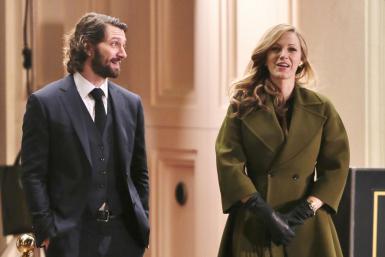
Combining the romantic precipitation-based love story of a Nicholas Sparks film with the same kind of fable-like mechanics of allegory as The Curious Case of Benjamin Button, Lee Toland Krieger's new film The Age of Adaline is a easy-to-watch snooze, a film far more attractive than it is actually entertaining. Part of that is in the casting of Blake Lively, Hollywood's most ironically-named actress; while Lively's cool detachment usually sabotages her in films, it actually slightly works here.
Lively plays the title character, a woman born early in the 20th Century who, after a combination of extreme cold and a lightning strike, becomes frozen in her body -- age cannot wither her, nor custom stale her infinite variety, as the saying goes. Now, she lives a quiet life, moving and changing her name every decade or so. It's exactly the kind of plan that gets screwed up in a movie like this ...
It'd be easy to have turned this material -- scripted by Salvador Paskowitz and J. Mills Goodloe, with the latter actually having Sparks-adapting experience on his resume -- into some kind of hunched, rushed thriller with the accidentaly-immortal Adaline running to hide her secret from those who want it. And, to be sure, there's a touch of that, but this film knows its audience and what it's shooting for: Adaline's perils are far more about her heart and soul than they are about her life-and-limb.
Shot by David lanzenberg (Celeste and Jesse Forever), The Age of Adaline unfurls in muted tones that are never clammy or damp; set in San Francisco, it's a film made of wood-tones and grey-sky lighting, with occasional walks into the verdant beauty of Northern California.
Much of the film is explained to us in the rough-but-resonant tones of narrator Hugh Ross, who also served the same function in The Assassination of Jesse James by the Coward Robert Ford; it's pretty much intoned, like a fable. that's one of it's more impressive tricks, actually: The film manages to incorporate a touch of magical realism without tipping over into pure science fiction or fantasy, turning Adaline's metaphysical condition into a metaphor for commitment and forward movement without leaning too heavily on those keys.
The supporting cast arrayed around Lively also helps. Michael Huisman (Game of Thrones) plays the boyish bearded billionaire -- apparently, they're like mailboxes in San Francisco, according to the movies -- who falls hard for Adaline and makes her question all her running and isolation; he's as good as his part lets him be. Harrison Ford plays Huisman's father, and plays him well, as his past with Adeline is discovered and figured out; the actor playing the young Ford, Anthony Ingruber, doesn't just do an imitation of Ford's voice, but even his facial expressions and familiar expressions, flickering between confidence and collapse as the circumstance requires. And as Adaline's daughter, who doesn't have her mother's gift, Ellen Burstyn brings fierce emotional realism to what could have been a flat, farcical part.
Again, there's nothing in The Age of Adaline to hate, but there's not much in it besides its florid atmosphere of immortal melancholy and the question of how much should -- how much must -- we sacrifice for real love? It's too bad that Adaline is more interestingly written than Lively can seem to portray her -- full of caution, someone who's literally seen it all, perceptive and a little prickly. A middling romance intended as counter-programming before a summer of world-savers and life-takers, The Age of Adaline is an adequate way to kill a few mortal hours in the theater for romance fans.










